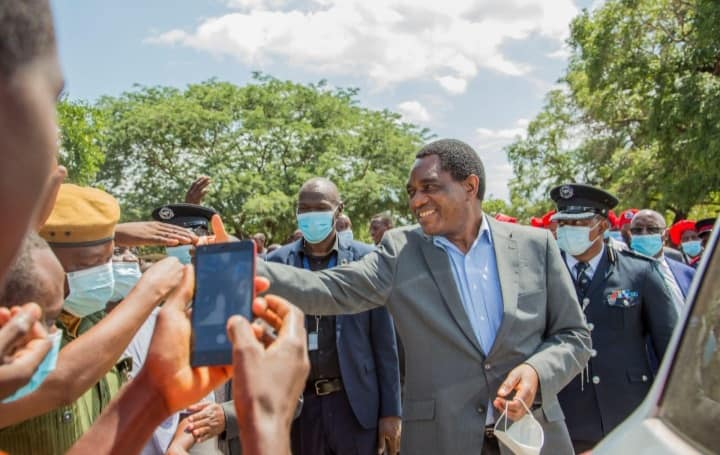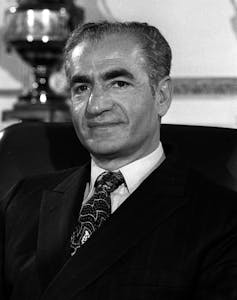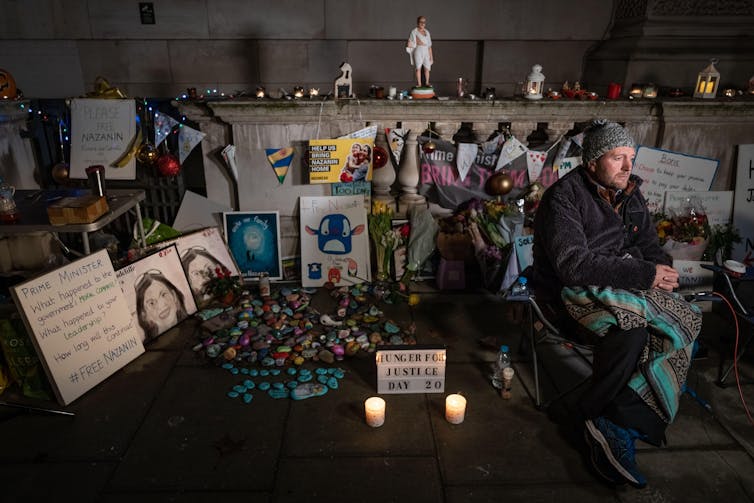But now by President Hichilema, the man who vowed to rescue it.

President Hakainde Hichilema of Zambia meeting supporters. Credit: Hakainde Hichilema/Facebook.
When Hakainde Hichilema won Zambia’s August 2021 election, many hoped the assault on democracy that had characterised his predecessor Edgar Lungu’s rule would come to an end. While in opposition, Hichilema had presented himself as a reform-minded politician determined to restore the rule of law, launch an anti-corruption campaign, strengthen democratic institutions, and protect human rights.
Nearly seven months into his five-year term, however, the new president is turning out to be a major disappointment. A pattern of worrying developments suggest that democracy is not returning to Zambia despite what many seem to believe.
Maintaining the anti-democratic status quo
Since taking office, Hichilema’s administration has shown little appetite to change the laws that enabled the authoritarian tendencies of his predecessor.
These include the law on defamation of the president, which makes it an offence to publish “any defamatory or insulting matter…with intent to bring the President into hatred, ridicule, or contempt”. This crime, punishable by up to three years’ imprisonment, has been widely interpreted and used to deter legitimate criticism. It has undermined media freedom, led to the arrest of critical voices and, especially under Lungu, created a culture of self-censorship.
Another such law is the Cyber Security and Cyber Crimes Act, which was hurriedly enacted by the Lungu administration on the eve of last year’s election. It violates the right to privacy by allowing the authorities to tap ICT devices, effectively turning everyone into a suspect, and confiscate electronics without proper procedural safeguards.
Finally, the Public Order Act (POA) requires any person who intends to convene a public meeting to “give police at least seven days’ notice” and other details. This colonial-era law has been used by successive administrations to restrict the rights to assembly and free speech. Under Lungu in particular, opposition meetings and demonstrations were repeatedly curtailed under the pretext of this act. Violations are punishable by up to six years’ imprisonment.
In opposition, Hichilema vowed to repeal the first two of these statutes immediately and reform the POA on assuming office. Under Zambian law, repealing an act of parliament requires a simple majority, and the governing United Party for National Development (UPND) holds 99 of the National Assembly’s 164 seats. In power, however, Hichilema has shown a studied disinterest in fulfilling these promises.
Undermining the media
Under Lungu, numerous critical media outlets were shut down. The Post, Zambia’s leading independent newspaper since the re-introduction of multiparty democracy in 1991, was forcibly closed in June 2016, less than two months before a general election, under the pretext of a disputed tax bill. Prime TV, the country’s leading private television station, was forcibly closed in April 2020 in the “public interest”, although no specific charges were laid out.
Hichilema’s administration is yet to close any media stations, but it has overseen four worrying developments.
First, the government has introduced a 16% Value Added Tax on newspaper sales, for both print and electronic copies. This move is widely seen as targeted at three private newspapers, since state-owned publications face no consequences for failure to meet their tax obligations. With the economy performing poorly and media outlets already struggling, this move threatens to raise the price of newspapers out of the reach of more Zambians and collapse the industry.
Second, the government has continued with the Lungu-era harassment of the private media. This January, the private TV station KBN published a leaked audio of a phone conversation between Hichilema’s political aide, Levy Ngoma, and permanent secretary in the Ministry of Home Affairs, Josephs Akafumba. In it, the two were heard plotting to use state institutions to undermine the opposition Democratic Party ahead of a by-election. Ngoma suggested the scheme was sanctioned by the president and vice-president.
Authorities initially claimed the audio was fake. When this failed, they accused the journalists of having tapped the pair’s phones. Instead of interrogating Ngoma and Akafumba, police arrested the reporters who had leaked the conversation. In what has become characteristic fashion, Hichilema, who no longer holds press conferences and has adopted Lungu’s unwanted legacy of addressing the country through press aides and on airport tarmacs, spoke through deafening silence.
Third, officials have intimidated independent media. Last month, the UPND MP Heartson Mabeta threatened News Diggers, arguably the most influential private newspaper, with closure after the publication ran a story quoting the UPND secretary general saying the party did not sign a contract with anyone to guarantee them employment. In a country reeling with record unemployment, the public backslash was huge, especially after the paper published the recording of the interview. Mabeta accused the newspaper of malice and warned that it risks meeting same fate as The Post if it did not change course. No one from the government or the UPND distanced themselves from the MP’s threats.
Fourth, the UPND has emulated its predecessor’s legacy of denying coverage to opposition parties in the state-run media. In opposition, Hichilema pledged to stop this culture by transforming the state media into genuine public platforms, establishing legal safeguards for editorial independence, and reviewing legislation that undermine their governance structures and leave them vulnerable to political interference. In power, however, it has been business as usual.
Assaulting free speech
As under Lungu, the assault on free speech under Hichilema has gone beyond just the media.
In December 2021, for instance, police arrested opposition Patriotic Front (PF) official Raphael Nakacinda after he advised the oft-traveling Hichilema to “put your buttocks down” and address the high cost of living. In January 2022, police arrested Morris Lungu, a 42-year-old taxi driver, on a charge of defamation for saying that “if there is a president who is a fool, it is the one who is there”. And, last month, 24-year-old Saliya Laisha was arrested following allegations she accused Hichilema of having sacrificed six youths, who died in unclear circumstances while on a boat cruise on Lake Kariba, “so that he can work well as has failed to do so”.
These arrests on charges of defamation have a chilling effect on even those who are not targeted as they show the costs of criticising officials. Many would prefer to self-censor than risk months or even years in protracted legal cases. The casualty is free speech and poor citizen participation in governance.
Dismantling the opposition
Given how opposition parties were continuously obstructed by Lungu, it was expected that Hichilema would behave differently. This has not been the case so far.
On 15 March 2022, for instance, the Deputy Speaker of the National Assembly banned 30 opposition lawmakers from parliament for 30 days. This followed their peaceful protest in November 2021, when the PF MPs noted that the finance minister had referenced constitutional provisions that no longer exist and asked for these anomalies to be corrected. When this request was rejected, the lawmakers converged in front of the Speaker’s mace, leading to a suspension of business for about 20 minutes. On resumption, the finance minister corrected the error and the debate proceeded peacefully.
Two MPs from the ruling party, however, then asked the Speaker if it was acceptable for the opposition MPs to remain in parliament when they had “intentionally disrespected it”. They claimed, without evidence, that “the only permissible means for Members to express displeasure was by walking out of the House”. The Speaker’s decision, reserved to a later date, was finally delivered on 15 March.
Protests are a commonplace tactic in multiparty democracies, and the form they can take is hardly prescribed anywhere. To treat the action by the PF MPs as a major offence highlights Zambia’s new slant towards repression in which any dissent is prohibited. The Deputy Speaker has the authority to reprimand lawmakers for misconduct, but she failed to establish how their protest amounted to contempt rather than legitimate protest, and why the first-time offenders warranted the maximum punishment of a month-long ban and suspended salaries.
If the 30 MPs challenge their suspension, the matter is unlikely to be decided before the expiry of the ban due to the slow pace of the courts. In December 2021, for instance, 9 PF MPs filed an urgent legal challenge to the Speaker’s decision to ban them from taking their seats before election petitions in their constituencies are resolved. The Constitutional Court only ruled on the matter today, three months on, siding with the PF complainants. The Deputy Speaker may well have factored these timings into her calculations.
The ongoing suspension of 39 of the PF’s 51 MPs suggests an organised effort to weaken the main opposition or intimidate it into submission. It also means there is effectively no opposition party in the National Assembly currently.
The suspensions also appear to be motivated by a desire for revenge. In June 2017, the then PF-aligned Speaker suspended 48 UPND lawmakers for boycotting Lungu’s state of the nation address. At the time, Hichilema and the UPND condemned the move as a brazen assault on democracy.
The recent onslaught on democratic rights under Hichilema has not attracted much outrage. This is largely because broad sections of civil society and international (mainly Western) actors support the new government, think it is too early to criticise the new administration, or simply consider the PF as undeserving of sympathy given its own terrible record on similar issues. When Shebby Chilekwa, a PF member and suspect in a murder investigation, recently complained that he had been tortured by the police while in detention and showed his scars, not even major human rights bodies expressed outrage.
Another example of the UPND undermining the opposition occurred this January. Days before the Kabwata parliamentary by-election, a candidate from a small opposition party, the United Progressive Party (UPP), announced his “withdrawal” from the race under highly dubious circumstances. Given the UPP had nothing to gain from this surprise move, many speculate the UPND induced this move for two reasons.
The first would have been to facilitate a new election date when Hichilema would have been available to campaign for his party’s candidate. Some argue that the president’s failure to dedicate ample time to a previous by-election in October 2021 cost the ruling party the seat. The second reason suggested was to allow the UPND to change its relatively unpopular candidate, Andrew Tayengwa, following internal party opposition to his rule.
As it was, any possible plan almost failed to come to fruition as the Electoral Commission refused to postpone the by-election, arguing that the UPP candidate had not resigned – a move that would have required re-organising the election – but merely withdrawn from the race. A few days later, however, the electoral body claimed to have received a letter from the UPP candidate, who had otherwise disappeared, categorically stating he had indeed resigned from the party. The Electoral Commission postponed the poll to 3 February.
For this delayed by-election, the UPND re-adopted Tayengwa – perhaps afraid its ruse would be too obvious otherwise – but deployed Hichilema alongside several cabinet ministers to literally camp out in Kabwata constituency. The ruling party narrowly beat the PF, while the UPP failed to run, explaining that it had expended its resources in the previous campaign.
This episode suggests that as well as pressuring state institutions to directly get involved in an internal party matter – the same tactics once used against the UPND – the ruling party is instigating divisions within opposition parties and over-stretching their meagre resources in the same way the PF did while in government. Opposition parties with little power are potentially being used to manipulate electoral law to suit Hichilema’s party. Again, the UPND is using the same tactics as the PF, but without the consequences of criticism from civil society and international actors.
Weakening civil society
Over the years, Zambia’s democracy has benefited from a robust and effective non-state sector capable of checking the power of the government. Such actors assumed principled positions that aligned with those adopted by the UPND when in opposition. The election of Hichilema has affected the effectiveness of civil society in two main ways.
The first is that many of the critical voices from academia, civil society and the church who spoke truth to power under Lungu have failed to remain impartial since Hichilema’s election. Previously neutral voices have become part of the choir of praise or gone silent. Others have been co-opted into government through appointments to parastatal boards, public bodies such as human rights commissions, or presidential advisory entities. One or two have applied for positions that can only be conferred by the president and are therefore unlikely to speak out unless their bids fail. Some remain in the long queue for appointments to public office, including diplomatic service.
The second is that previously effective civil society organisations that were seen as having aligned themselves to Lungu, such as the Law Association of Zambia, now lack legitimacy to critique the actions of Hichilema. The result is a weakening civil society and the ironic situation in which the PF, the party that almost collapsed the country’s democratic institutions, finds itself slowly becoming the new defender of the public interest.
Hichilema has shown himself to be out of his depth on many key issues. He only appears positive in contrast to the disastrous Lungu, but as memories of the PF’s terrible record fade, the new president’s shortcomings may dawn on more people. If the public become disenchanted with the UPND, voters are more likely to see the PF differently, especially if the former governing party manages to resolve its leadership question and comes out of its elective conference united. If Hichilema’s political position becomes threatened, he may resort to bribery, repression, or both. Unless civil society wakes up soon or new progressive voices emerge, Zambia’s democracy may return to the same position it was in under Lungu.
Nurturing corruption
Hichilema has demonstrated a lack of commitment to fighting corruption in three main ways.
The first is the lack of example. Despite being elected a platform of anti-corruption, accountability and transparency, Hichilema has so far failed to disclose the value of his assets. Along with Lungu, he is the only major party nominee and president to do so.
This is especially concerning as Zambian presidents have generally used state power to accumulate wealth. In less than 16 months in power, for instance, Lungu’s net worth grew from K10.9 million ($0.62million) in 2015 to K23.7 million ($1.34 million) when he ran for re-election in 2016. He refused to reveal his net worth ahead of last year’s vote, perhaps due to fears that knowledge of his opulence would increase calls for the removal of his immunity if he lost the election. Although there is no evidence to suggest Hichilema has started stealing public funds or using public office to promote his private interests, his reluctance to publish his net worth is concerning given his extensive business interests.
The second is that over six months in office, Hichilema’s anti-corruption strategy has been chaotic at best and non-existent at worst. The grand corruption of the Lungu era is well known yet not a single member of the former regime has been taken to court on serious corruption charges. Hichilema continues to accuse PF leaders of having presided over a corrupt administration, but mostly to delegitimise the opposition party’s reputation rather than to signal plans to prosecute those who looted public funds. Moreover, members of the kleptocratic networks that were deeply involved in high-level corruption under Lungu have since transitioned and cultivated new allies in the governing party.
The third is that Hichilema has ignored accusations of the corruption in his own government. When opposition parties presented evidence showing executive involvement in an inflated fertiliser contract awarded to one of the president’s business associates, for instance, Hichilema kept quiet. The president has also backtracked from his commitment to delink the presidency from the Industrial Development Corporation (IDC), the holding company of all parastatal bodies in the country. In opposition, Hichilema condemned Lungu and, earlier, Michael Sata for their failure to amend the IDC Act, which allows the president to chair the board of the parastatal, providing opportunities for patronage or corruption and undermining corporate governance. In power, Hichilema no longer sees anything wrong with this arrangement.
Failure to tackle political violence
Under Lungu, political violence around election was commonplace. The perpetrators were usually PF supporters, while UPND supporters were typically the victims. The police rarely arrested PF cadres but were quick to unleash brutality on opposition members, occasionally culminating in fatalities.
Again, Hichilema pledged to end this culture of political violence, but if the two by-elections since his election are any indicator, very little has changed. The polls in both Kaumbwe, Eastern Province, Kabwata, Lusaka, featured violent activities that saw suspected UPND cadres beat opposition supporters. As under the PF, none of the culprits were arrested even when the victims identified the perpetrators and formally lodged reports to the police. The political violence in Kabwata was even preceded by clear threats of violence from senior UPND members, none of whom has been arrested or reprimanded by the party’s leadership.
The false narrative of democratic resurgence
Although it may have slightly improved under Hichilema, Zambia’s democratic trajectory remains most concerning. Based on its early track record, the Hichilema administration has shown a lack of willingness to make structural changes to strengthen accountable, democratic governance. As a result, Zambian institutions will remain as susceptible to manipulation as they were under Lungu.
The recent narrative of a democratic resurgence in Zambia does not adhere to the reality, one that has seen the intimidation of independent media, the arrest of critics for insulting the president, the use of state institutions to undermine the opposition, the weakening of civil society, and the continued corruption in government. Contrary to what many are saying, Zambia is not returning to democracy. Not yet.







